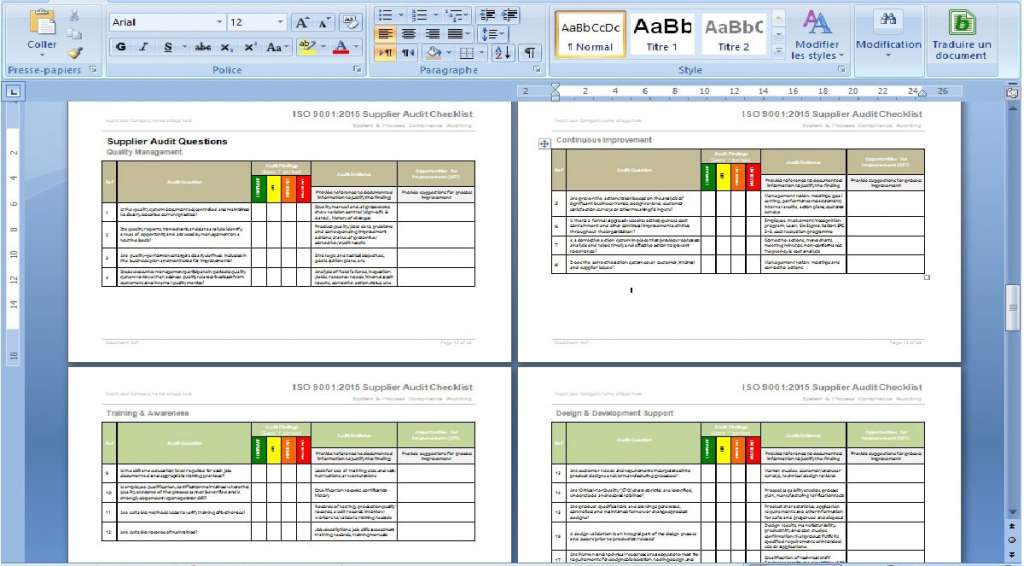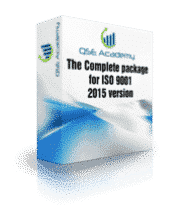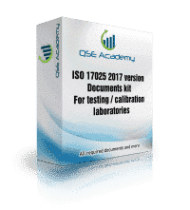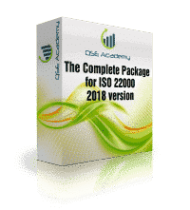HACCP Package
2025-03-27 12:00HACCP Package
Get your accreditation at the lowest possible cost


HACCP complete package
2020 version



Price : 489 $
Certification Made Simple and Accessible for Your Business
The complete HACCP Compliance package is a comprehensive document set that contains everything from all the templates of procedures, processes, forms, checklists, tools, detailed guides, and instructions needed to:
- Start your HACCP compliance process.
- Create your HACCP documentation.
- Quickly access HACCP compliance.
- Benefit from a HACCP management system that is simple and tailored to the needs of your organization.

Why start with a blank page. Start your Project TODAY, and save up to 80% on your time and money.

This package comes with 1 hour Live 1-to-1 Online Session with ISO consultant, document reviews, continual email support for 12 months and regular update service.

Cost-Effective Implementation: Much cheaper than an on-site consultant, and requires much less time than doing it from scratch
HACCP 2020 version Complete Package
• Added Value: All HACCP compliance requirements have been developed into an efficient process that adds operational value to your organization and consequently increases productivity.
• Effective: Minimal effort is required to follow the procedures necessary to meet all HACCP requirements.
• Simplified: Bureaucracy and excessive paperwork have been eliminated from each process to make it easy—while remaining fully compliant with HACCP regulations.
Start your Project TODAY, and save up to 80% on your time and money.
The all-in-one document package for HACCP 2020 version
Save time, save money and simplify the accreditation process.
Documents included:

Forms
This package provides you with the following features:
- Full lifetime access
- Access on a laptop, desktop, and mobile
Certificate of completion
This Package Includes
Procedures:
- Hazard Analysis Procedure
- HACCP Plan Development Procedure
- HACCP Team Formation Procedure
- Product Description Procedure
- Process Flow Diagram Procedure
- CCP Identification Procedure
- Critical Limit Determination Procedure
- Monitoring System Procedure
- Corrective Action Procedure
- Verification Procedure
- Validation Procedure
- Record-Keeping Procedure
- HACCP System Review Procedure
- Pre-Requisite Program Procedure
- Supplier Approval Procedure
- Internal Audit Procedure
- Traceability and Recall Procedure
- Allergen Management Procedure
- Calibration Procedure
- Cleaning and Sanitation Procedure
- Pest Control Procedure
Records and Forms:
- Hazard Analysis Worksheet
- HACCP Plan Summary
- HACCP Team Meeting Minutes
- Product Description Form
- Process Flow Diagram Form
- CCP Decision Tree Worksheet
- Critical Limits Worksheet
- Monitoring Records
- Corrective Action Records
- Verification Records
- Validation Records
- Record-Keeping Log
- HACCP System Review Records
- Pre-Requisite Program Records
- Supplier Approval Form
- Internal Audit Report
- Traceability and Recall Records
- Allergen Management Log
- Calibration Log
- Cleaning and Sanitation Log
- Pest Control Log

Manual and quality policy
- HACCP Manual
Others:
- HACCP Training Materials
- HACCP Team Member Job Descriptions
- HACCP Certificate

SOPs
- SOP for Hazard Analysis
- SOP for HACCP Plan Development
- SOP for HACCP Team Formation
- SOP for Product Description
- SOP for Process Flow Diagram
- SOP for CCP Identification
- SOP for Critical Limit Determination
- SOP for Monitoring System
- SOP for Corrective Action
- SOP for Verification
- SOP for Validation
- SOP for Record-Keeping
- SOP for HACCP System Review
- SOP for Pre-Requisite Programs
- SOP for Supplier Approval
- SOP for Internal Audit
- SOP for Traceability and Recall
- SOP for Allergen Management
- SOP for Calibration
- SOP for Cleaning and Sanitation
- SOP for Pest Control

HACCP Documentation Requirements Explained
The HACCP Documentation Package is a vital resource for food businesses committed to identifying, evaluating, and controlling food safety hazards. This comprehensive package includes all the essential documentation needed to implement a fully compliant Hazard Analysis and Critical Control Points (HACCP) system, in line with international food safety standards and regulatory requirements.
Clear, complete, and well-structured documentation is critical for preventing food safety issues, demonstrating due diligence, and passing regulatory inspections or third-party audits. From hazard analysis to corrective actions, this package supports consistency, compliance, and consumer protection.
Why HACCP Documentation Matters
HACCP is a globally recognized food safety system that focuses on preventing hazards rather than reacting to them. Proper documentation is key to ensuring food safety plans are implemented effectively, monitored consistently, and adjusted as needed. It also provides the evidence needed for inspections, audits, and legal compliance.
This package includes:
Key HACCP Documentation Categories
| Document | Purpose in HACCP System |
|---|---|
| HACCP Plan | Core document identifying hazards, CCPs, and control measures |
| Hazard Analysis Worksheet | Identifies potential biological, chemical, and physical hazards |
| CCP Decision Tree | Tool used to determine if a step is a Critical Control Point |
| Critical Limits and Monitoring Procedures | Establishes thresholds and defines how CCPs are measured and controlled |
| Corrective Action Records | Documents steps taken when monitoring shows deviation from critical limits |
| Verification and Validation Procedures | Ensures the HACCP system is working as intended |
| Prerequisite Program (PRP) Documentation | Supports foundational programs like cleaning, training, pest control, etc. |
| Product Traceability and Recall Procedures | Enables rapid product identification and withdrawal in the event of an issue |
Core HACCP Documentation Requirements
Management System Documentation
A successful HACCP system requires a strong foundation of policies, procedures, and defined responsibilities. This package includes:
Food Safety Policy – States the organization’s commitment to food safety and regulatory compliance.
HACCP Team Roles and Responsibilities – Defines who is involved in system development, implementation, and maintenance.
Flow Diagrams for Each Product or Process – Maps the full production process to support hazard analysis.
Change Control and Document Management Procedures – Ensures documents remain current, approved, and accessible.
Training and Competence Records – Demonstrates that staff are trained in HACCP principles and food safety practices.
Operational Control Documentation
Day-to-day control of processes is at the heart of HACCP. This package includes:
CCP Monitoring Logs – Tracks data at critical control points (e.g., temperature, pH, metal detection).
Sanitation Standard Operating Procedures (SSOPs) – Ensures equipment and environments are cleaned to specification.
Calibration and Maintenance Records – Verifies measurement equipment used at CCPs is accurate and reliable.
Allergen Control Procedures – Prevents cross-contact and supports accurate labeling.
Product Specifications and Incoming Material Records – Maintains quality and safety standards for ingredients and packaging.
Verification, Review, and Improvement Documentation
HACCP systems must be regularly reviewed and improved based on performance and external changes. This package includes:
Internal Audit Checklists and Reports – Verifies implementation and identifies areas needing attention.
HACCP Plan Review Records – Documents periodic reviews or reviews triggered by changes in product or process.
Validation Reports – Demonstrates that CCPs and control measures effectively control hazards.
Corrective and Preventive Action Logs – Tracks responses to deviations and identifies trends or systemic issues.
Customer Complaint and Incident Records – Captures external feedback and drives continual improvement.
Legal and Supporting Documentation
Regulatory Requirements Register – Tracks applicable food safety regulations and compliance measures.
Supplier Approval and Monitoring Procedures – Ensures incoming materials come from reliable and safe sources.
Pest Control Contracts and Reports – Supports hygiene and facility safety.
Food Fraud and Food Defense Assessments – Identifies vulnerabilities and strengthens protection against intentional threats.
Recall Simulation Records – Verifies effectiveness of the recall procedure through mock exercises.
Ensure Compliance with HACCP Today!
Establishing and maintaining a fully compliant HACCP system is essential for protecting consumers, satisfying legal obligations, and gaining market access. With the HACCP Documentation Package, your food business will be equipped with everything needed to prevent hazards, document control, and ensure audit readiness.
💡 Get started today and strengthen your food safety system with a structured, reliable, and HACCP-compliant documentation package!
90 Days Money Back Guarantee

If for whatever reason during the FIRST 90 days of your purchase, you are not satisfied for any reason, simply contact support@qse-academy.com and our support team will issue you an immediate and full refund.
The package includes all the documents you need to comply with HACCP – these documents are fully acceptable by the accreditation audit.

All documents are in MS Word or MS Excel, to make them very easy to customize for your business. You can customize them by adding company logos and colors, and edit headers and footers to match your favorite style.

We have already completed about 90% of the information requested on the documents. To complete them you must fill in only the name of the company, the responsible parties, and any other information unique to your company. you will be guided through the process, commenting on the elements that are needed and those that are optional.
We presented the HACCP documentation, so as to assure all its users that they have completed everything accurately and with the utmost efficiency.

All the documents are made so that you can follow the proposed order perfectly, which allows you to make sure that nothing is missing, and that no one gets lost in the process.
The included comments and flowcharts help your staff understand each document and its usefulness, which helps you to make quality management more fluid, and processes easier to follow.
Features of the complete HACCP Kit
Price: 489 $
– Documentation included: 58 documents for the implementation of HACCP
– MS Office 2007 format, MS Office 2010, MS Office 2013
– Language: English
– Documents are fully editable – just enter the information specific to your business.
– Acceptable for the HACCP accreditation audit? Yes, all the documents required by HACCP are included, as well as the quality policy and the current but optional procedures.
Instant Delivery – The package is downloadable immediately after purchase
Free Consultation – In addition, you can submit two complete documents for review by professionals.
Created for your business – The models are optimized for small and medium businesses.


Complete HACCP Package
The complete kit to implement HACCP
For calibration and testing laboratories
Price : 489 $
Total Implementation Duration: 8 Months
HACCP Implementation Project Plan
Achieving HACCP is a significant milestone for any organization, signifying a commitment to data protection and privacy. Our expert consultants are here to guide you through every step of the implementation process, from initial consultation and gap analysis to final assessment and compliance certification. With our comprehensive project plan, tailored training programs, and dedicated support, we ensure your organization meets all HACCP requirements efficiently and effectively. Partner with us to enhance your organization’s credibility, improve data handling processes, and gain trust on an international scale. Let us help you achieve excellence in data privacy management.
Introduction: Preliminary Steps and Team Formation (Duration: 1 Month)
Introductory Tasks
1.1 Assemble the HACCP Team
Task: Appoint a HACCP Team Leader
- Description: Appoint a qualified individual to lead the HACCP implementation process, ensuring they have relevant food safety and process expertise.
- Deliverables: HACCP team leader appointment.
- Meeting: Initial consultation with senior management to formalize the appointment.
Task: Form the HACCP Team
- Description: Assemble a multidisciplinary team from various departments (e.g., production, quality assurance, engineering) to support the development of the HACCP plan.
- Deliverables: HACCP team member list and roles.
- Meeting: Kick-off meeting with the HACCP team to discuss roles and objectives.
1.2 Product Description and Intended Use
Task: Develop a Detailed Product Description
- Description: Create detailed descriptions for all products in the scope of HACCP, including ingredients, packaging, processing methods, and storage requirements.
- Deliverables: Product description documents.
- Meeting: Review product descriptions with the HACCP team.
Task: Identify the Intended Use of Products
- Description: Define the intended use of each product, including target consumers and any special considerations (e.g., vulnerable populations like infants or elderly consumers).
- Deliverables: Intended use documentation.
- Meeting: Team review to finalize product use scenarios.
1.2 Develop a Process Flow Diagram
Task: Create a Process Flow Diagram
- Description: Develop a process flow diagram that outlines all steps of production, from raw material intake to finished product dispatch, including storage and distribution.
- Deliverables: Process flow diagram.
- Meeting: Review and validate the process flow diagram with the HACCP team.
Section 1: Hazard Analysis and Identification of Critical Control Points (Duration: 2 MonthS)
2.1 Conduct Hazard Analysis (HACCP Principle 1)
Task: Identify Potential Hazards
- Description: Perform a hazard analysis to identify all potential biological, chemical, and physical hazards at each step of the process outlined in the process flow diagram.
- Deliverables: Hazard identification report.
- Meeting: HACCP team meeting to review identified hazards.
2.2 Assess the Severity and Likelihood of Hazards
Task: Conduct Risk Assessment
- Description: Assess the likelihood and severity of identified hazards to determine which ones pose significant risks to food safety.
- Deliverables: Hazard risk assessment report.
- Meeting: Review risk assessment outcomes with the HACCP team.
2.3 Determine Critical Control Points (CCPs) (HACCP Principle 2)
Task: Identify CCPs
- Description: Based on the hazard analysis, identify the critical control points (CCPs) where hazards can be prevented, eliminated, or reduced to acceptable levels.
- Deliverables: List of CCPs.
- Meeting: HACCP team meeting to validate and finalize CCPs.
Section 2: Establish Critical Limits and Monitoring Procedures (Duration: 2 Months)
3.1 Establish Critical Limits for Each CCP (HACCP Principle 3)
Task: Define Critical Limits
- Description: Set measurable critical limits (e.g., time, temperature, pH) for each identified CCP to ensure food safety is maintained.
- Deliverables: Critical limits documentation.
- Meeting: Review critical limits with the HACCP team and technical experts.
3.2 Develop Monitoring Procedures (HACCP Principle 4)
Task: Establish Monitoring Procedures for Each CCP
- Description: Develop procedures to monitor CCPs, ensuring they stay within critical limits. Define who will conduct monitoring, the frequency, and the method of monitoring.
- Deliverables: Monitoring procedures and schedule.
- Meeting: Train staff on monitoring procedures and responsibilities
Section 3: Establish Corrective Actions and Verification Procedures (Duration: 1 Month)
4.1 Define Corrective Actions for CCP Deviations (HACCP Principle 5)
Task: Develop Corrective Actions
- Description: Establish specific corrective actions to be taken when monitoring indicates that a CCP is out of control or critical limits are exceeded.
- Deliverables: Corrective action plan for each CCP.
- Meeting: Review corrective actions with HACCP team and train relevant staff.
4.2 Establish Verification Procedures (HACCP Principle 6)
Task: Develop Procedures for Verification of the HACCP System
- Description: Set up verification procedures to confirm that the HACCP system is functioning effectively. This includes activities such as internal audits, equipment calibration, and validation of CCP monitoring.
- Deliverables: Verification procedures and audit schedule.
- Meeting: Internal meeting with quality assurance and production teams to review verification activities.
Section 4: Record-Keeping and Documentation (Duration: 1 Month)
5.1 Develop Documentation and Record-Keeping Procedures (HACCP Principle 7)
Task: Create HACCP Documentation
- Description: Develop comprehensive records for monitoring CCPs, corrective actions, and verification activities. Ensure documentation complies with food safety regulatory requirements.
- Deliverables: HACCP documentation templates (e.g., monitoring logs, corrective action records).
- Meeting: Train staff on documentation and record-keeping procedures.
5.2 Implement Record-Keeping System
Task: Set Up Record-Keeping System
- Description: Establish a record-keeping system to store all HACCP-related documentation. Ensure it is accessible, organized, and maintained for regulatory inspections and audits.
- Deliverables: Record-keeping system (electronic or manual).
- Meeting: Review system with key staff and ensure proper implementation.
Section 5: Final Implementation and HACCP Plan Review (Duration: 1 Month)
6.1 Conduct a Final Internal Audit of the HACCP Plan
Task: Perform an Internal Audit
- Description: Conduct a full internal audit of the HACCP plan to ensure all principles are correctly implemented and the system is operational. Identify any remaining gaps or areas for improvement.
- Deliverables: Internal audit report, corrective actions (if needed).
- Meeting: Review audit findings with senior management and the HACCP team.
6.2 Final Review and Approval of the HACCP Plan
Task: Review and Approve the HACCP Plan
- Description: Perform a final review of the HACCP plan, ensuring it covers all critical aspects of food safety. Submit the plan for approval to senior management or external auditors as required.
- Deliverables: Final HACCP plan.
- Meeting: Management meeting to approve and adopt the HACCP plan.
Ongoing Phase: Continuous Monitoring, Review, and Improvement (Duration: Ongoing)
7.1 Continuous Monitoring and Review
Task: Monitor CCPs and Review Records
- Description: Continuously monitor CCPs and review the HACCP records to ensure compliance with critical limits. Adjust processes as necessary based on findings from monitoring and audits.
- Deliverables: Monthly monitoring reports, updated logs.
- Meeting: Regular review meetings with HACCP team.
7.2 Conduct Regular HACCP Reviews and Audits
Task: Schedule and Conduct Regular HACCP Audits
- Description: Plan periodic internal audits and reviews of the HACCP system to ensure it remains effective and up-to-date with any changes in the production process or food safety regulations.
- Deliverables: Audit schedule, audit reports, and action plans.
- Meeting: Quarterly or annual review meetings with senior management and HACCP team.
This 8-month project plan for HACCP implementation ensures a structured approach to food safety management, covering the preliminary steps, hazard analysis, critical control point identification, and final system implementation. Regular monitoring and reviews are established for the ongoing success of the HACCP system.
What our customers think:

“The HACCP Package from QSE Academy has been a game changer for our team. The documents were incredibly easy to customize, saving us hours of work that we would have otherwise spent creating templates from scratch. The clear instructions and real-time guidance helped us stay on track and avoid costly mistakes during the compliance process. We were able to achieve HACCP accreditation faster than anticipated, and the cost was a fraction of what an on-site consultant would have charged us. I highly recommend this package for any organization seeking to streamline their HACCP compliance journey.”
Emily Harper
Food Safety Manager


“The QSE Academy HACCP package allowed us to implement our food safety system with minimal effort. The pre-filled templates and clear guidelines saved us a significant amount of time, letting us focus on day-to-day operations instead of reinventing the wheel. From a cost perspective, this package is a real bargain compared to hiring external consultants or dedicating full-time staff to develop the documentation. In the end, we achieved compliance in record time, while significantly reducing the overall implementation costs. This product is a must-have for any business serious about food safety.”
James O'Connor
Operations Director

Frequently Asked Questions
How long will it take to receive the complete package of documents after I place my order?
Upon completing your purchase, you will be redirected to the download page immediately. Additionally, a link to access your file will be sent to your email. The files are provided in a .zip format, which you will need to extract. If you encounter any issues with the download, please do not hesitate to contact us at support@qse-academy.com. Our support team is always ready to assist you.
What payment methods can I use?
We offer several payment options for your convenience. You can choose to pay using a credit card, debit card, or PayPal. Additionally, we provide a flexible layaway plan for those who prefer to pay for their purchase over time. If you have any questions about our payment options, please don’t hesitate to contact us.
Do you offer a money-back guarantee if I'm not satisfied with the service?
We offer a 30-day money-back guarantee. If you are not satisfied with our service for any reason, you can cancel within the first 30 days and receive a full refund, no questions asked.
Is there ongoing support or assistance available after my purchase?
Yes! At QSE Academy, our ISO experts provide continued support by answering your queries via email. You can expect a detailed response within 24 to 48 hours to help you move forward confidently.
Are updates to the documentation package included after purchase?
Absolutely. To ensure your documentation remains reliable and compliant, we update our packages every 6 months. Existing customers receive these minor updates at no extra charge. However, when there’s a major revision of the ISO standard itself, you’ll need to purchase an updated kit to align with the new standard.
Will I receive a valid invoice for my business expenses after completing the purchase?
Yes. After completing your purchase, you’ll immediately receive a valid invoice suitable for business and tax purposes. If you require any specific adjustments or details added to your invoice, please reach out to our support team.
Can I customize these documents for my company's specific needs?
Yes, the documents are fully customizable! You can easily edit, modify, and add your company’s logo to tailor them specifically for your organization. Additionally, if you’d prefer assistance, we offer a personalized “Done-For-You” customization service to deliver audit-ready documents tailored exactly to your organization’s requirements.
How quickly can I implement this ISO standard using your documentation?
Implementation time varies depending on your company’s engagement, resources, and experience. Typically, we’ve observed businesses successfully achieve compliance and certification within 3 to 6 months using our clear, structured documentation packages.
Do these documents guarantee successful certification?
While our documentation packages significantly simplify the certification process, the ultimate success of ISO certification depends on effective implementation. For organizations seeking further assurance, we also provide comprehensive support services, including guided implementation and internal audits, to help you confidently pass your certification audit.
Do you offer hands-on assistance if I need extra help during implementation?
Definitely! If you prefer a complete, hands-off solution, we offer a premium “Done-For-You” implementation service. Our ISO experts handle the full preparation, providing you with audit-ready documentation and detailed implementation support. You simply adopt the customized materials, follow the tailored guidelines, and confidently pass your audit.






